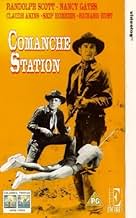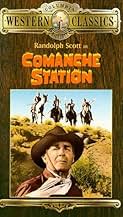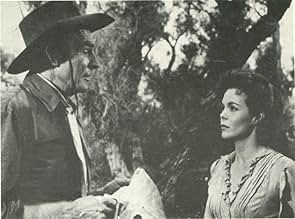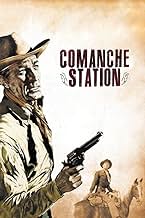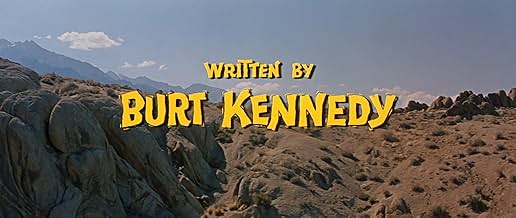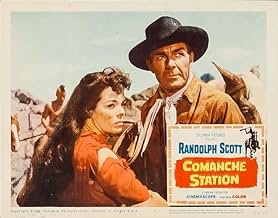IMDb RATING
7.0/10
4.9K
YOUR RATING
A man saves a woman who had been kidnapped by Comanches, then struggles to get both of them home alive.A man saves a woman who had been kidnapped by Comanches, then struggles to get both of them home alive.A man saves a woman who had been kidnapped by Comanches, then struggles to get both of them home alive.
- Director
- Writer
- All cast & crew
- Production, box office & more at IMDbPro
7.04.8K
1
2
3
4
5
6
7
8
9
10
Featured reviews
Your basic solid western with a twist ending
A magazine article recently cited this movie as an underrated western. I certainly agree. Randolph Scott made his best westerns in the latter part of his career, and this is one of those. The movie examines the old west moral code of right v. wrong and raps up with a surprising twist ending that gives cynicism a kick in the rear end. Not a big splashy western, but a solid little one.
Scott dukes it out with Claude Akins
The last of the seven Scott/Boetticher collaborations and although it's not one of my favorites {THE TALL T (1957) and RIDE LONESOME (1959) come out ahead}, it's still worth owning on DVD if Columbia/Tristar ever sees fit to release it.
Randolph Scott plays a rancher named Jefferson Cody who's wife was kidnapped by the Comanches a few years before. When he hears that the Comanches are holding a white woman, he goes to them for a trade and winds up with another man's wife named Mrs. Lowe (Nancy Gates).
As they head back, they stop at Comanche Station in order to water their horses and get fresh supplies. When they arrive there, they see three men being chased by a bunch of Comanches on the warpath. Cody recognizes one of them as Ben Lane (Claude Akins), a soldier he had drummed out of the army for an atrocity against the Indians, many years before. He also suspects Lane is trafficking in scalps and that's why the Indians are after them.
They manage to fight them off and when the coast is clear, Lane informs Mrs. Lowe that she has a $5,000 reward put up for her by her husband. Mrs. Lowe then suspects Cody of his intentions but it's apparent from the beginning that Cody isn't interested in any reward money. He just wants to find out what happened to his wife.
Also Lane has a habit of saying "Ha-lo.." every time he's being addressed. A nice script touch put in there by Burt Kennedy who wrote the script. It gives Lane something to distinguish him by.
It now becomes a battle of wills between Cody and Lane with Mrs. Lowe and Lane's two dimwitted sidemen (played by Skip Homeier and Richard Rust) looking on. When Frank (Homeier) is sent up the creek to see if the Comanches have cut off their trail, he comes floating back down, dead with an arrow in his back. And later when Dobie (Rust) has a change of heart and wants to throw in with Cody, he gets shot in the back by Lane for his efforts.
That shot warns Cody that Lane is nearby and the inevitable showdown takes place in the Lone Pine rocks. We all know who wins that one, right? Cody finally brings Mrs. Lowe back to her husband only to learn that he is blind and really doesn't care what's happened to her. He just wants her back.
Beautiful widescreen print that was remastered in the late 1990s, this one would be a welcome addition to any western library. It needs a DVD release.
7 out of 10
Randolph Scott plays a rancher named Jefferson Cody who's wife was kidnapped by the Comanches a few years before. When he hears that the Comanches are holding a white woman, he goes to them for a trade and winds up with another man's wife named Mrs. Lowe (Nancy Gates).
As they head back, they stop at Comanche Station in order to water their horses and get fresh supplies. When they arrive there, they see three men being chased by a bunch of Comanches on the warpath. Cody recognizes one of them as Ben Lane (Claude Akins), a soldier he had drummed out of the army for an atrocity against the Indians, many years before. He also suspects Lane is trafficking in scalps and that's why the Indians are after them.
They manage to fight them off and when the coast is clear, Lane informs Mrs. Lowe that she has a $5,000 reward put up for her by her husband. Mrs. Lowe then suspects Cody of his intentions but it's apparent from the beginning that Cody isn't interested in any reward money. He just wants to find out what happened to his wife.
Also Lane has a habit of saying "Ha-lo.." every time he's being addressed. A nice script touch put in there by Burt Kennedy who wrote the script. It gives Lane something to distinguish him by.
It now becomes a battle of wills between Cody and Lane with Mrs. Lowe and Lane's two dimwitted sidemen (played by Skip Homeier and Richard Rust) looking on. When Frank (Homeier) is sent up the creek to see if the Comanches have cut off their trail, he comes floating back down, dead with an arrow in his back. And later when Dobie (Rust) has a change of heart and wants to throw in with Cody, he gets shot in the back by Lane for his efforts.
That shot warns Cody that Lane is nearby and the inevitable showdown takes place in the Lone Pine rocks. We all know who wins that one, right? Cody finally brings Mrs. Lowe back to her husband only to learn that he is blind and really doesn't care what's happened to her. He just wants her back.
Beautiful widescreen print that was remastered in the late 1990s, this one would be a welcome addition to any western library. It needs a DVD release.
7 out of 10
If I loved her, it wouldn't matter.
Comanche Station is produced and directed by Budd Boetticher and stars Randolph Scott, Claude Akins, Nancy Gates, Skip Homeier & Richard Rust. It's written by Burt Kennedy with music and cinematography from Mischa Bakaleinikoff & Charles Lawton Jr. respectively.
Jefferson Cody has for many years been looking for his wife who was kidnapped by Indians. Taking time out from his futile search, he trades with the Comanches to get a woman, Nancy Gates, released. During the journey back to reunite Nancy with her husband, they run into an outlaw and his two protégés. Stating that the Comanches are on their trail and speaking about a reward being offered for Nancy, relations start to disintegrate by the hour.
This was to be the last of seven collaborations between director Budd Boetticher and Western legend Randolph Scott, and it's a most fitting sign off from the duo. Between them they managed to make Westerns with an almost haunting cloud hanging over them, themes of loneliness, complex characters and scenarios segue throughout their output. Here in this fine picture we find Scott's Cody in a complete state of loneliness, but outside of the pain the character clearly carries with him, Cody is a classic Western hero, courage and integrity are fortitude's by which he lives his life.
As this tale unfolds it's evident that Boetticher isn't prepared to offer up conventional Western standards, this, like many of Boetticher's other Westerns, is not a standard Oater, a good versus evil fable, it's a cunningly intelligent picture that's both sad in texture, and also in heart. The film is boosted by Charles Lawton Jr's camera work as he captures some stunning outdoor scenery, the rugged rocks and dusky land creates some striking compositions around the troubled characters.
See this if you are one of those people who thinks Westerns were merely an excuse for Cowboys and Indians high jinx. Boetticher and Scott, leading lights in the sub genre that featured the Ranown Westerns. 8/10
Jefferson Cody has for many years been looking for his wife who was kidnapped by Indians. Taking time out from his futile search, he trades with the Comanches to get a woman, Nancy Gates, released. During the journey back to reunite Nancy with her husband, they run into an outlaw and his two protégés. Stating that the Comanches are on their trail and speaking about a reward being offered for Nancy, relations start to disintegrate by the hour.
This was to be the last of seven collaborations between director Budd Boetticher and Western legend Randolph Scott, and it's a most fitting sign off from the duo. Between them they managed to make Westerns with an almost haunting cloud hanging over them, themes of loneliness, complex characters and scenarios segue throughout their output. Here in this fine picture we find Scott's Cody in a complete state of loneliness, but outside of the pain the character clearly carries with him, Cody is a classic Western hero, courage and integrity are fortitude's by which he lives his life.
As this tale unfolds it's evident that Boetticher isn't prepared to offer up conventional Western standards, this, like many of Boetticher's other Westerns, is not a standard Oater, a good versus evil fable, it's a cunningly intelligent picture that's both sad in texture, and also in heart. The film is boosted by Charles Lawton Jr's camera work as he captures some stunning outdoor scenery, the rugged rocks and dusky land creates some striking compositions around the troubled characters.
See this if you are one of those people who thinks Westerns were merely an excuse for Cowboys and Indians high jinx. Boetticher and Scott, leading lights in the sub genre that featured the Ranown Westerns. 8/10
Typical material handled in an exceptional way
This is the final film that was directed by Budd Boetticher and starring Randolph Scott. Like their previous collaborations, they both work together to produce Westerns that manage to rise above the mediocre norm. In this film, a fairly typical plot idea is executed very well--with a grace and style that make the film well worth seeing.
Randolph Scott, as usual, plays a nice but tough guy. He's brave enough to come into a Comanche stronghold in order to negotiate for the release of a White woman kidnapped by the tribe. However, trouble is in store when three drifters come upon Scott and the woman. It seems that the leader of this group (Claude Akins) is a real rogue and plans with his men to kill Scott and the woman. It seems that the woman's husband has offered a reward for her--and it can be collected dead or alive! So what did I like about the film? First, as usual, Randolph Scott is amazing. He plays the perfect cowboy hero--tough, slow to speak and anger but also a decent man through and through. Plus, he's much more believable than the bigger than life characters John Wayne usually played. I loved Wayne's films, but he was always too tough and too in command. Scott is much more like a very capable 'everyman' character. Second, as usual, Boetticher deliberately underplays the action--producing a muted but also quite believable film. Third, the film had a really nice ending--quite the twist.
You can't do a lot better than a Scott/Boetticher western. While this isn't their best, it certainly is quite good.
Randolph Scott, as usual, plays a nice but tough guy. He's brave enough to come into a Comanche stronghold in order to negotiate for the release of a White woman kidnapped by the tribe. However, trouble is in store when three drifters come upon Scott and the woman. It seems that the leader of this group (Claude Akins) is a real rogue and plans with his men to kill Scott and the woman. It seems that the woman's husband has offered a reward for her--and it can be collected dead or alive! So what did I like about the film? First, as usual, Randolph Scott is amazing. He plays the perfect cowboy hero--tough, slow to speak and anger but also a decent man through and through. Plus, he's much more believable than the bigger than life characters John Wayne usually played. I loved Wayne's films, but he was always too tough and too in command. Scott is much more like a very capable 'everyman' character. Second, as usual, Boetticher deliberately underplays the action--producing a muted but also quite believable film. Third, the film had a really nice ending--quite the twist.
You can't do a lot better than a Scott/Boetticher western. While this isn't their best, it certainly is quite good.
One of the great side-lined Westerns
Story details by other reviewers of Commanche Station are well written; I would like to look at details of this side-lined Western.
To fully understand the nature of Randolph Scott Westerns you have to think the 1950's; I can because I was there, watching every ' cowboy film ' that came out. Westerns then were part of a boys everyday life. I remember at the age of 8-10 riding around my home town on an imaginary horse; we even formed imaginary posses!.....and Westerns were being shown at local cinemas every week.
Randolph Scott played other parts in his long career but achieved a curious fame as a man-of-few-words cowboy. What was it that drew audiences to him despite his limited acting ability?
It is simply this. He was tall and lean, epitomising the rangy, half-starved loner who is doomed, like the Flying Dutchmen to roam the western badlands fruitlessly. He was stoic, thin- lipped, stern-looking, brooding, with sad eyes, forever looking to the next horizon, as he does in this film. If you look into Scott's face there's faint suggestion of longing, a faint wistfulness, hidden by a determined effort to hide any weakness. It's a face that no other western hero has, making Scott a magnet on screen......in the light of this,his acting ability was not in question.
Comanche Station also has a surprisingly good performance from Claude Akins; in fact, stealing a few scenes from Scott. He epitomized malevolency and cold cunning, but smiled easily, perversely emphasising points he made in the character. One long observation his character made concerning Nancy's return to her husband was loaded with cynicism and spite....perfect.In the action scenes he showed himself also to be a fine horseman.....if that really was him firing a rifle on horseback!
Nancy Gates cruised thru her role with little impact; but what western girl didn't?......in the hard, troubled world of the 1950's clearly defined male cowboy, there was little room for strong females.
Commanche Station is a great Western because of it's love affair with the very nature of the genre; tall enigmatic men, the outback, the wide open spaces, the tumbled rocks that threaten to hide hoards of Indians, and the ever-present but unloved horses, surely the most unsung animal of all time.
You'll remember this film because of these things; but mostly because here, encapsulated in 70 minutes, are all of the elements and nuances that all great westerns have or should have.
What more do you want?!
To fully understand the nature of Randolph Scott Westerns you have to think the 1950's; I can because I was there, watching every ' cowboy film ' that came out. Westerns then were part of a boys everyday life. I remember at the age of 8-10 riding around my home town on an imaginary horse; we even formed imaginary posses!.....and Westerns were being shown at local cinemas every week.
Randolph Scott played other parts in his long career but achieved a curious fame as a man-of-few-words cowboy. What was it that drew audiences to him despite his limited acting ability?
It is simply this. He was tall and lean, epitomising the rangy, half-starved loner who is doomed, like the Flying Dutchmen to roam the western badlands fruitlessly. He was stoic, thin- lipped, stern-looking, brooding, with sad eyes, forever looking to the next horizon, as he does in this film. If you look into Scott's face there's faint suggestion of longing, a faint wistfulness, hidden by a determined effort to hide any weakness. It's a face that no other western hero has, making Scott a magnet on screen......in the light of this,his acting ability was not in question.
Comanche Station also has a surprisingly good performance from Claude Akins; in fact, stealing a few scenes from Scott. He epitomized malevolency and cold cunning, but smiled easily, perversely emphasising points he made in the character. One long observation his character made concerning Nancy's return to her husband was loaded with cynicism and spite....perfect.In the action scenes he showed himself also to be a fine horseman.....if that really was him firing a rifle on horseback!
Nancy Gates cruised thru her role with little impact; but what western girl didn't?......in the hard, troubled world of the 1950's clearly defined male cowboy, there was little room for strong females.
Commanche Station is a great Western because of it's love affair with the very nature of the genre; tall enigmatic men, the outback, the wide open spaces, the tumbled rocks that threaten to hide hoards of Indians, and the ever-present but unloved horses, surely the most unsung animal of all time.
You'll remember this film because of these things; but mostly because here, encapsulated in 70 minutes, are all of the elements and nuances that all great westerns have or should have.
What more do you want?!
Did you know
- TriviaLast of the "Ranown Westerns", produced by Randolph Scott and his partner Harry Joe Brown under the Ranown Pictures banner. Scott decided to retire after this one, but two years later he was talked out of retirement by Sam Peckinpah for Ride the High Country (1962). After that film, Scott retired for good.
- GoofsDuring the final shootout with Claude Akins, Randolph Scott and Nancy Gates run and hide in a small rock cave in the hills. As they look out of the cave, a crew member in a blue shirt stands in the path in front of them. When Randolph Scott leaves the cave, he runs right past this crew member.
- ConnectionsFeatured in The Guardian Interview with Budd Boetticher (1994)
- How long is Comanche Station?Powered by Alexa
Details
- Runtime
- 1h 13m(73 min)
- Aspect ratio
- 2.35 : 1
Contribute to this page
Suggest an edit or add missing content


